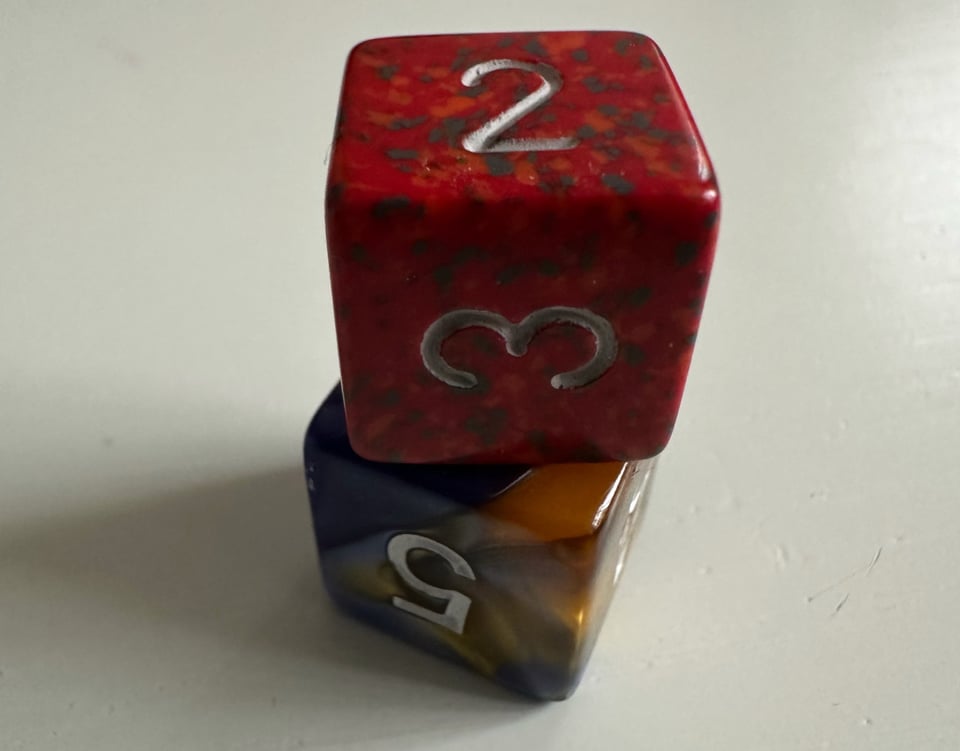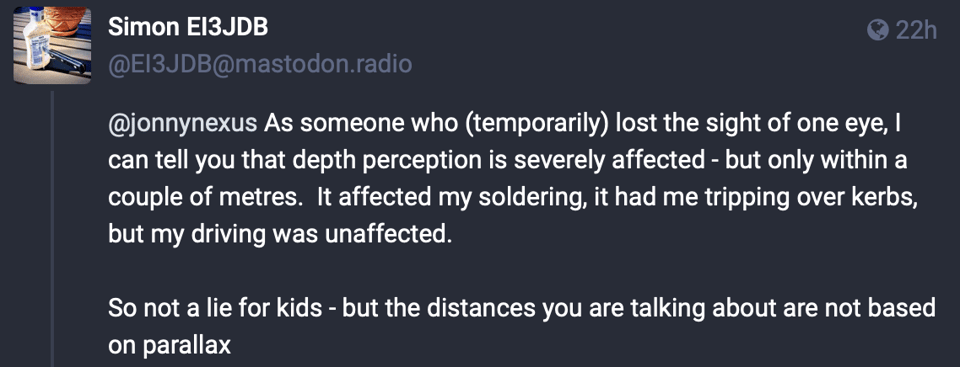Vision: The Stuff I Didn't Say In My Previous Post
When I was a teenager, I played a lot of RPGs with my friends*, although calling them "friends" is perhaps stretching it a bit, given that of the four of them, three of them blackmailed me on at least one occasion. Let's call them "guys I hung around with" (plus Stu, who never blackmailed me and is still a good friend).
Anyhow, one of them was blind in one eye. One day we were playing an RPG and someone - not him - rolled two six-sided dice. (It might have been Traveller, or maybe D&D and they'd just got a natural 20 with a shortsword, or something). As the dice landed, he exclaimed: "God! How'd you do that?"
"Do what?" we all replied, confused.
"Get one dice to land on top of another," he replied.

Except, one dice wasn't on top of the other. They were both lying on the table, one behind the other, but from his angle they must have been positioned in just the right positions to make it appear that one was on top of the other. Of course, if he'd had two working eyes with binocular vision, he'd not have been fooled, because it wouldn't have been possible for both eyes' views to line up just so.
This is a roundabout way of saying that I might have oversimplified things in my previous post: What A Huge Indoor Waterpark Can Teach Us About Vision. So to clarify...
My teacher said that the reason we can see in three dimensions is because we have two eyes on the front of our head which give us binocular vision. I, then, took this to mean that the reason we perceive the world in three dimensions, with depth, is because we have two eyes on the front of our head.
This isn't true, as I realised when I put a hand over one eye and the world I viewed remained three dimensional (and I was confused). As I explained in the previous post, the reason we perceive the world in three dimensions is because our brain builds a three dimensional model. But the binocular vision granted by our two front-mounted eyes is an incredibly useful input to that model, enabling it to be much more accurate, at least at closer distances - at longer distances, as with the Tropical Islands dome, it's no help at all.
If you have only one working eye, you still view a fully three dimensional world, but your brain is now having to guesstimate all the distances, rather than just the longer ones. And so many close-in tasks will be harder.
Continuing on this theme, I got a very interesting reply to the Mastodon post I made sharing the previous piece:

So to try and summarise all this, I would say that we see depth because our brain builds us a three-dimensional model of what our eyes are seeing. Having two front-mounted eyes with binocular vision makes that three-dimensional model much more accurate at closer ranges. Like I said, lies to children. It's not that it's not true, but that it's not the full picture.
As a final aside, Tropical Islands isn't the first time I've encountered the phenomenon of your brain underestimating the size of an unknown object that turns out to be huge. I previously encountered it back in November 2020 when, in between lockdowns, Violet and I walked to the wind turbines on a nearby ridge to make a YouTube video. As with the dome, my brain had no stored / saved knowledge of how big these things are, and there were no details to help my grey matter work it out.

I think my brain guessed that they were about three or four double-decker buses in height. The truth is that they're eighteen double-decker buses in height. They are seriously huge. The upshot was that when we climbed up the slopes and emerged onto the ridge's flat(ish) plateau, my brain told me that they were perhaps a couple of minutes walk away. The truth was that they were more like a mile away. (It's a quite big, flat plateau).
So we walked, and we walked, and we walked, but the more we walked, the more they completely failed to get any closer. The reason, of course, was that as they failed to significantly increase in viewed size despite our walking towards them, my brain was constantly recalibrating its guess as to how big they were. ("Maybe they're four buses high... or perhaps five... six maybe... seven, it's got to be seven, right... nope, eight?").
It wasn't until we got near enough to one that you had to start tipping your head back to see the its top that my brain could start crunching some numbers based on angles and come up with an accurate height.
Our brains do incredible, complex tasks. I think sometimes it takes them screwing up now and again for us to appreciate that.
*If you're wondering if the blackmail involved something particularly salacious, it didn't. My family were Christians and we went to church every Sunday. My so-called-friends found out about that and threatened to reveal it to the entire school unless I agreed to submit to their demands. In a 1980s English secondary (high) school something like this would have made me an absolute laughing stock. I'd have been bullied mercilessly.